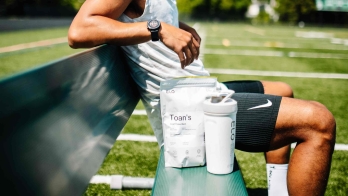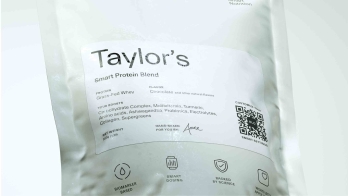Strategies to reduce inflammation
If you’re looking for ways to reduce inflammation, examining what you eat, drink, and supplement is a good place to start. From improving sleep habits to eating less sugar, here are the top science-backed strategies to keep a lid on inflammation.
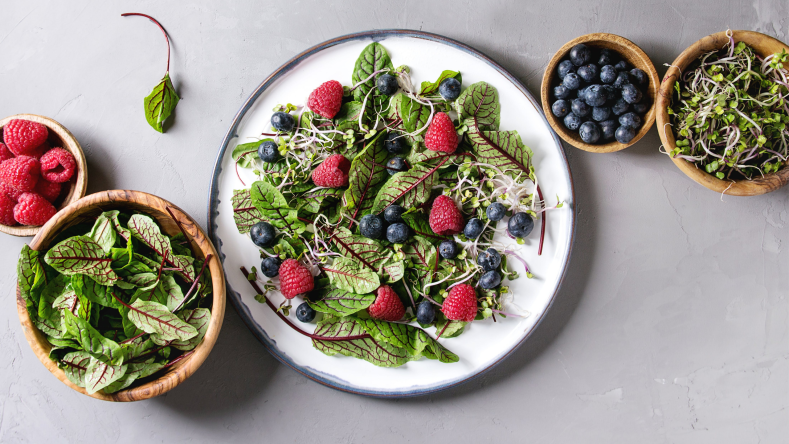
Inflammation has been a hot topic these days, and for a good reason. What you eat, drink, and supplement can impact inflammatory markers, while sleep, stress, and exercise also play a critical role. But exactly is inflammation, why should you be aware of it, and what can you do to reduce the risk of inflammatory-related chronic diseases? Before taking a deep dive into some strategies to reduce inflammation, let’s start by understanding the principles of inflammation and the impact it has on health.
What is inflammation?
Inflammation is the body’s natural response to signals of injury or infection and occurs when a physical factor triggers an immune reaction [ 1
What causes inflammation?
There are two types of inflammation �— acute and chronic. The former happens when you cut your knee, twist your ankle, or catch a cold, and goes away as you recover. Chronic inflammation occurs when the inflammatory response lingers and leaves your body in a constant state of stress.
You can measure inflammation through inflammatory markers, such as C-reactive protein (CRP), which is made in the liver. As inflammation increases, so does the production of CRP. A simple blood test can determine if you have elevated CRP levels; anything less than 10 mg/L is considered normal, whereas over 10 mg/L is considered high [ 2 3
Inflammatory diseases
While inflammation is necessary for your body to protect itself, it can also be a symptom of many chronic illnesses. Here are some of the most common inflammatory diseases.
Cancer
Research indicates that chronic inflammation can result in cell mutation, tumorigenesis, cellular proliferation, and metastasis [ 4 5 6 7 8

Heart disease
It’s becoming more evident that heart disease and inflammation are strongly connected. Studies have found that high levels of cholesterol in the bloodstream can lead to excess LDL (bad cholesterol) and elevated CRP levels, which are associated with a threefold increased risk of heart attacks [ 9
Alzheimer's
Emerging evidence suggests that chronic inflammation could be a culprit in Alzheimer’s disease. One study showed that those suffering from Alzheimer’s disease or mild cognitive impairment have higher inflammation when compared with those without dementia [ 10
Diabetes
Studies have found that inflammation can contribute to type 2 diabetes by disrupting the pathways involved in glucose metabolism [ 11 12
How to reduce inflammation in the body
Chronic inflammation can be reversed with a variety of lifestyle, dietary, and supplement choices. Here are some science-backed ways for keeping a lid on inflammation.
Lifestyle suggestions to reduce inflammation
Cut back on alcohol. Excessive drinking (>2 drinks/day) goes hand-in-hand with chronic inflammation. Studies have found that alcohol has detrimental effects throughout the entire body, and negatively affects organs, tissues, and gut/brain health [
13
,14
]. Alcohol also increases your risk of liver, breast, pancreas, and colon cancers by converting into acetaldehyde (a carcinogenic compound) and increasing DNA mutation [18
].
Learn more about how alcohol affects weight gain and inflammation with
this article
.

Stay active. Studies show that moderate-intensity exercise curbs inflammatory activity by positively influencing levels of adrenaline, cortisol, and growth hormone, and diminishing the expression of toll-like receptors (TLRs) in immune cells [
15
].Reduce intake of processed foods. Diets rich in added sugar, processed foods, and red meat have been found to enhance inflammation and increase the risk of breast, prostate, and colorectal cancers [
16
,17
,18
].Maintain a healthy weight. Research has found that chronic inflammation can negatively affect leptin, a hormone that helps regulate food intake and energy use. As such, studies show that those who are obese tend to have higher levels of leptin and elevated CRP levels compared to others who maintain a healthy weight [
19
]. Moreover, other research has found that losing body fat can reduce inflammatory markers and lower the risk of chronic disease [26
].Get enough sleep. A chronic lack of shut-eye has been associated with increased inflammatory markers, like cytokines, interleukin-6, and CRP [
20
]. To improve overall health, aim to get between 7 to 9 hours of sleep each night.
If you struggle to fall (or stay) asleep,
here are some natural supplement options
that might help.
Manage chronic stress levels. Research shows that stress cn cause inflammation and lead to a number of chronic conditions (like cardiovascular disease, IBD, obesity, and rheumatoid arthritis) [
35
]. To help manage chronic stress levels, try meditating, going for a walk, journaling, or talking with a friend.
Foods to reduce inflammation
What you put on your fork goes a long way in lowering the risk of chronic disease. Here are some of the best foods to reduce inflammation.
Foods rich in omega-3. Researchers have found that omega-3 fatty acids fight inflammation, and assist with cholesterol control [
21
]. Since our bodies can’t produce omega-3’s we must rely on dietary sources (such as salmon, trout, tuna, and sardines) and/or supplements to meet our needs.
You can get your omega-3s with
Iwi
, Elo’s new, ground-breaking vegan omega-3 product. Learn more about it withthis article
.
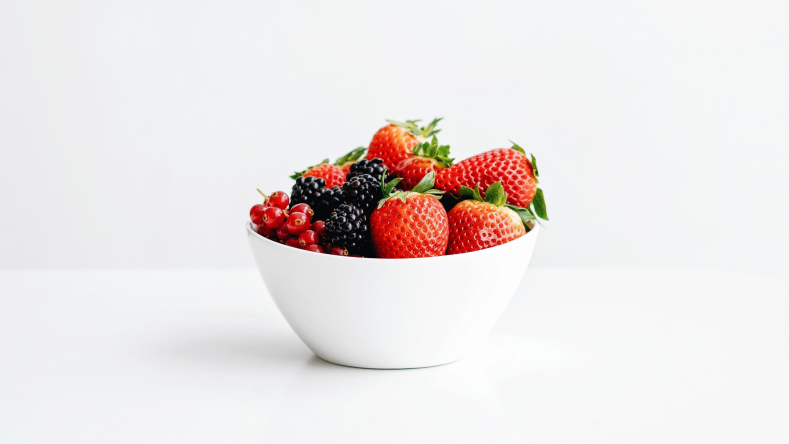
Berries. Berries contain antioxidants that have anti-inflammatory effects and may reduce your risk of certain chronic diseases [
22
]. One study discovered that people who ate strawberries each day experienced lower levels of inflammatory markers associated with heart disease when compared to those who didn’t eat strawberries [23
].Olive oil. Studies have found that oleic acid (the main fatty acid in olive oil) can reduce levels of CRP and inhibit other genes and proteins that propel inflammation [
24
,25
].High fiber foods. Fiber feeds the good bacteria in your gut and consuming a high-fiber diet may lower inflammation [
27
]. Studies have found that people who eat a high-fiber diet (>5 g/fiber/serving) have 25 - 54% lower CRP levels compared to those who consume less fiber [27
].
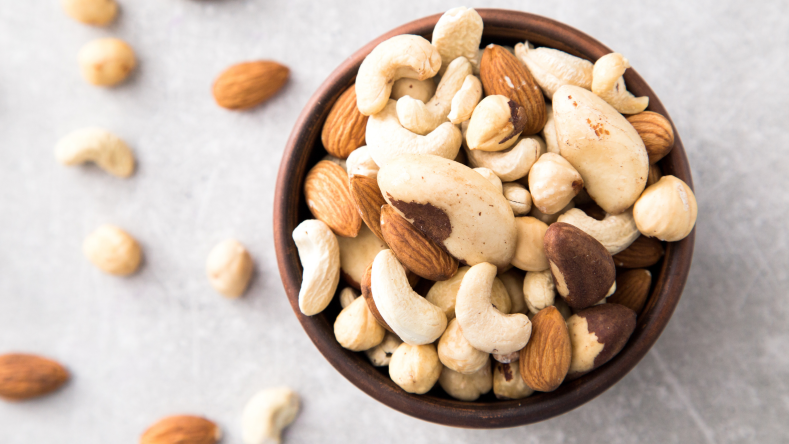
Nuts. Research shows that walnuts and almonds have a positive effect on inflammatory markers and may reduce the risk of heart disease [
28
].Leafy greens. If you’re looking to see a decrease in CRP levels, then try adding an extra serving of spinach to your morning smoothie. Studies have found that those who ate a diet rich in dark green leafy vegetables experienced reduced inflammatory markers over time [
29
].
Supplements to reduce inflammation
Some supplements have also been shown to lower inflammation:
Turmeric. This sunflower-yellow spice has long been praised for its many anti-inflammatory benefits. Research shows that curcumin (the main ingredient in turmeric) may be beneficial for decreasing inflammation associated with conditions such as diabetes, heart disease, IBD, arthritis, and other autoimmune diseases [
30
].Ginger. Ginger consumption has been found to have anti-inflammatory benefits, as it can reduce oxidative stress and inhibit inflammatory responses in the brain [
31
].Vitamin D. This essential vitamin plays a big role in immune health, but it also may positively impact inflammatory markers. Low vitamin D levels have been associated with higher levels of inflammation (particularly when it comes to COVID-19 and its severity) [
32
].Garlic. One study found that when participants had over 3 g of garlic extract/day, they experienced notable improvements on certain inflammatory markers; however, this study noted that even 2 g of garlic/day (one clove) can be beneficial for inflammation [
33
].Vitamin C. Well-known for its immune support, this antioxidant-vitamin may help reduce inflammation by neutralizing free radicals that cause oxidative damage to cells [
34
].
Summary
Chronic inflammation plays a role in obesity, heart disease, cancer, autoimmune disease, and arthritis, and what you eat, drink, and supplement can have a major impact on inflammatory markers. Lifestyle adjustments such as consuming a diet rich in whole foods, staying active, limiting alcohol intake, getting enough sleep, and adding anti-inflammatory supplements can help tame inflammation, minimize disease risk, and help you feel your best for many years to come.
Disclaimer: The text, images, videos, and other media on this page are provided for informational purposes only and are not intended to treat, diagnose or replace personalized medical care.
Key takeaways
Inflammation is the body’s natural response to signals of injury or infection and occurs when a physical factor triggers an immune reaction [
1
].C-reactive protein (CRP) is an inflammatory marker that can be used to determine inflammation in the body. CRP levels greater than 1.0 mg/L usually suggest inflammation, whereas levels greater than 3 mg/L indicate a higher risk for cardiovascular disease, cancer, and various other conditions [
2
].Chronic inflammation can contribute to excess body fat and blood sugar dysfunction, both of which increase the risk for type 2 diabetes [
12
].Chronic inflammation can be reversed with a variety of lifestyle, dietary, and supplement choices.
References
Chen, L., Deng, H., Cui, H., Fang, J., Zuo, Z., Deng, J., Li, Y., Wang, X., & Zhao, L. (2017). Inflammatory responses and inflammation-associated diseases in organs. Oncotarget, 9(6), 7204–7218.
https://doi.org/10.18632/oncotarget.23208
C-reactive protein test. Healthline. Retrieved March 25, 2022 from https://www.healthline.com/health/c-reactive-protein
Wang, H. J. (2010). Alcohol, inflammation, and gut-liver-brain interactions in tissue damage and disease development. World Journal of Gastroenterology, 16(11), 1304.
https://doi.org/10.3748/wjg.v16.i11.1304
Singh, N., Baby, D., Rajguru, J. P., Patil, P. B., Thakkannavar, S. S., & Pujari, V. B. (2019). Inflammation and cancer. Annals of African medicine, 18(3), 121–126.
https://doi.org/10.4103/aam.aam_56_18
Zhao, H., Wu, L., Yan, G., Chen, Y., Zhou, M., Wu, Y., & Li, Y. (2021). Inflammation and tumor progression: Signaling pathways and targeted intervention. Signal Transduction and Targeted Therapy, 6(1).
https://doi.org/10.1038/s41392-021-00658-5
University of Texas M. D. Anderson Cancer Center. (2021, September 16). Link between inflammation and pancreatic cancer development uncovered. ScienceDaily. Retrieved March 9, 2022 from
www.sciencedaily.com/releases/2021/09/210916142902.htm
Bishayee A. (2014). The role of inflammation and liver cancer. Advances in experimental medicine and biology, 816, 401–435.
https://doi.org/10.1007/978-3-0348-0837-8_16
Long, A. G., Lundsmith, E. T., & Hamilton, K. E. (2017). Inflammation and Colorectal Cancer. Current colorectal cancer reports, 13(4), 341–351.
https://doi.org/10.1007/s11888-017-0373-6
Shrivastava, A. K., Singh, H. V., Raizada, A., & Singh, S. K. (2015). C-reactive protein, inflammation and coronary heart disease. The Egyptian Heart Journal, 67(2), 89–97.
https://doi.org/10.1016/j.ehj.2014.11.005
Huang, C., Irwin, M. G., Wong, G., & Chang, R. (2018). Evidence of the impact of systemic inflammation on neuroinflammation from a non-bacterial endotoxin animal model. Journal of neuroinflammation, 15(1), 147.
https://doi.org/10.1186/s12974-018-1163-z
Tsalamandris, S., Antonopoulos, A. S., Oikonomou, E., Papamikroulis, G. A., Vogiatzi, G., Papaioannou, S., Deftereos, S., & Tousoulis, D. (2019). The Role of Inflammation in Diabetes: Current Concepts and Future Perspectives. European cardiology, 14(1), 50–59.
https://doi.org/10.15420/ecr.2018.33.1
Ellulu, M. S., Patimah, I., Khaza'ai, H., Rahmat, A., & Abed, Y. (2017). Obesity and inflammation: the linking mechanism and the complications. Archives of medical science : AMS, 13(4), 851–863.
https://doi.org/10.5114/aoms.2016.58928
Wang, H. J., Zakhari, S., & Jung, M. K. (2010). Alcohol, inflammation, and gut-liver-brain interactions in tissue damage and disease development. World journal of gastroenterology, 16(11), 1304–1313.
https://doi.org/10.3748/wjg.v16.i11.1304
Qamar, N., Castano, D., Patt, C., Chu, T., Cottrell, J., & Chang, S. L. (2019). Meta-analysis of alcohol induced gut dysbiosis and the resulting behavioral impact. Behavioural brain research, 376, 112196.
https://doi.org/10.1016/j.bbr.2019.112196
Scheffer, D., & Latini, A. (2020). Exercise-induced immune system response: Anti-inflammatory status on peripheral and central organs. Biochimica et biophysica acta. Molecular basis of disease, 1866(10), 165823.
https://doi.org/10.1016/j.bbadis.2020.165823
Park, J., Morley, T. S., Kim, M., Clegg, D. J., & Scherer, P. E. (2014). Obesity and cancer--mechanisms underlying tumour progression and recurrence. Nature reviews. Endocrinology, 10(8), 455–465.
https://doi.org/10.1038/nrendo.2014.94
Mentella, M. C., Scaldaferri, F., Ricci, C., Gasbarrini, A., & Miggiano, G. (2019). Cancer and Mediterranean Diet: A Review. Nutrients, 11(9), 2059.
https://doi.org/10.3390/nu11092059
Ratna, A., & Mandrekar, P. (2017). Alcohol and Cancer: Mechanisms and Therapies. Biomolecules, 7(3), 61.
https://doi.org/10.3390/biom7030061
Bianchi V. E. (2018). Weight loss is a critical factor to reduce inflammation. Clinical nutrition ESPEN, 28, 21–35.
https://doi.org/10.1016/j.clnesp.2018.08.007
Dzierzewski, J. M., Donovan, E. K., Kay, D. B., Sannes, T. S., & Bradbrook, K. E. (2020). Sleep inconsistency and markers of inflammation. Frontiers in Neurology, 11.
https://doi.org/10.3389/fneur.2020.01042
Calder P. C. (2010). Omega-3 fatty acids and inflammatory processes. Nutrients, 2(3), 355–374.
https://doi.org/10.3390/nu2030355
Joseph, S. V., Edirisinghe, I., & Burton-Freeman, B. M. (2014). Berries: anti-inflammatory effects in humans. Journal of agricultural and food chemistry, 62(18), 3886–3903.
https://doi.org/10.1021/jf4044056
Afrin, S., Gasparrini, M., Forbes-Hernandez, T. Y., Reboredo-Rodriguez, P., Mezzetti, B., Varela-López, A., Giampieri, F., & Battino, M. (2016). Promising Health Benefits of the Strawberry: A Focus on Clinical Studies. Journal of agricultural and food chemistry, 64(22), 4435–4449.
https://doi.org/10.1021/acs.jafc.6b00857
Basu, A., Devaraj, S., & Jialal, I. (2006). Dietary factors that promote or retard inflammation. Arteriosclerosis, thrombosis, and vascular biology, 26(5), 995–1001.
https://doi.org/10.1161/01.ATV.0000214295.86079.d1
Konstantinidou, V., Covas, M. I., Muñoz-Aguayo, D., Khymenets, O., de la Torre, R., Saez, G., Tormos, M., Toledo, E., Marti, A., Ruiz-Gutiérrez, V., Ruiz Mendez, M. V., & Fito, M. (2010). In vivo nutrigenomic effects of virgin olive oil polyphenols within the frame of the Mediterranean diet: a randomized controlled trial. FASEB journal : official publication of the Federation of American Societies for Experimental Biology, 24(7), 2546–2557.
https://doi.org/10.1096/fj.09-148452
Bianchi, V. E. (2018). Weight loss is a critical factor to reduce inflammation. Clinical Nutrition ESPEN, 28, 21–35.
https://doi.org/10.1016/j.clnesp.2018.08.007
North, C. J., Venter, C. S., & Jerling, J. C. (2009). The effects of dietary fibre on C-reactive protein, an inflammation marker predicting cardiovascular disease. European journal of clinical nutrition, 63(8), 921–933.
https://doi.org/10.1038/ejcn.2009.8
Yu, Z., Malik, V. S., Keum, N., Hu, F. B., Giovannucci, E. L., Stampfer, M. J., Willett, W. C., Fuchs, C. S., & Bao, Y. (2016). Associations between nut consumption and inflammatory biomarkers. The American journal of clinical nutrition, 104(3), 722–728.
https://doi.org/10.3945/ajcn.116.134205
Schultz, H., Ying, G. S., Dunaief, J. L., & Dunaief, D. M. (2019). Rising Plasma Beta-Carotene Is Associated With Diminishing C-Reactive Protein in Patients Consuming a Dark Green Leafy Vegetable-Rich, Low Inflammatory Foods Everyday (LIFE) Diet. American journal of lifestyle medicine, 15(6), 634–643.
https://doi.org/10.1177/1559827619894954
Kunnumakkara, A.B., Bordoloi, D., Padmavathi, G., Monisha, J., Kishor Roy, N., Prasad, S., & Aggarwal, B.B. (2017). Curcumin, the golden nutraceutical: multitargeting for multiple chronic diseases. British Journal of Pharmacology, 174,1325–1348.
http://accurateclinic.com/wp-content/uploads/2020/10/Curcumin-the-golden-nutraceutical-multitargeting-for-multiple-chronic-diseases-2017.pdf
Wang, S., Zhang, C., Yang, G., & Yang, Y. (2014). Biological properties of 6-gingerol: a brief review. Natural product communications, 9(7), 1027–1030.
Laird, E., Rhodes, J., & Kenny, R. A. (2020). Vitamin D and Inflammation: Potential Implications for Severity of Covid-19. Irish medical journal, 113(5), 81.
Xu, C., Mathews, A. E., Rodrigues, C., Eudy, B. J., Rowe, C. A., O'Donoughue, A., & Percival, S. S. (2018). Aged garlic extract supplementation modifies inflammation and immunity of adults with obesity: A randomized, double-blind, placebo-controlled clinical trial. Clinical nutrition ESPEN, 24, 148–155.
https://doi.org/10.1016/j.clnesp.2017.11.010
Carr, A. C., & Maggini, S. (2017). Vitamin C and Immune Function. Nutrients, 9(11), 1211.
https://doi.org/10.3390/nu9111211
Liu, Y. Z., Wang, Y. X., & Jiang, C. L. (2017). Inflammation: The Common Pathway of Stress-Related Diseases. Frontiers in human neuroscience, 11, 316.
https://doi.org/10.3389/fnhum.2017.00316


